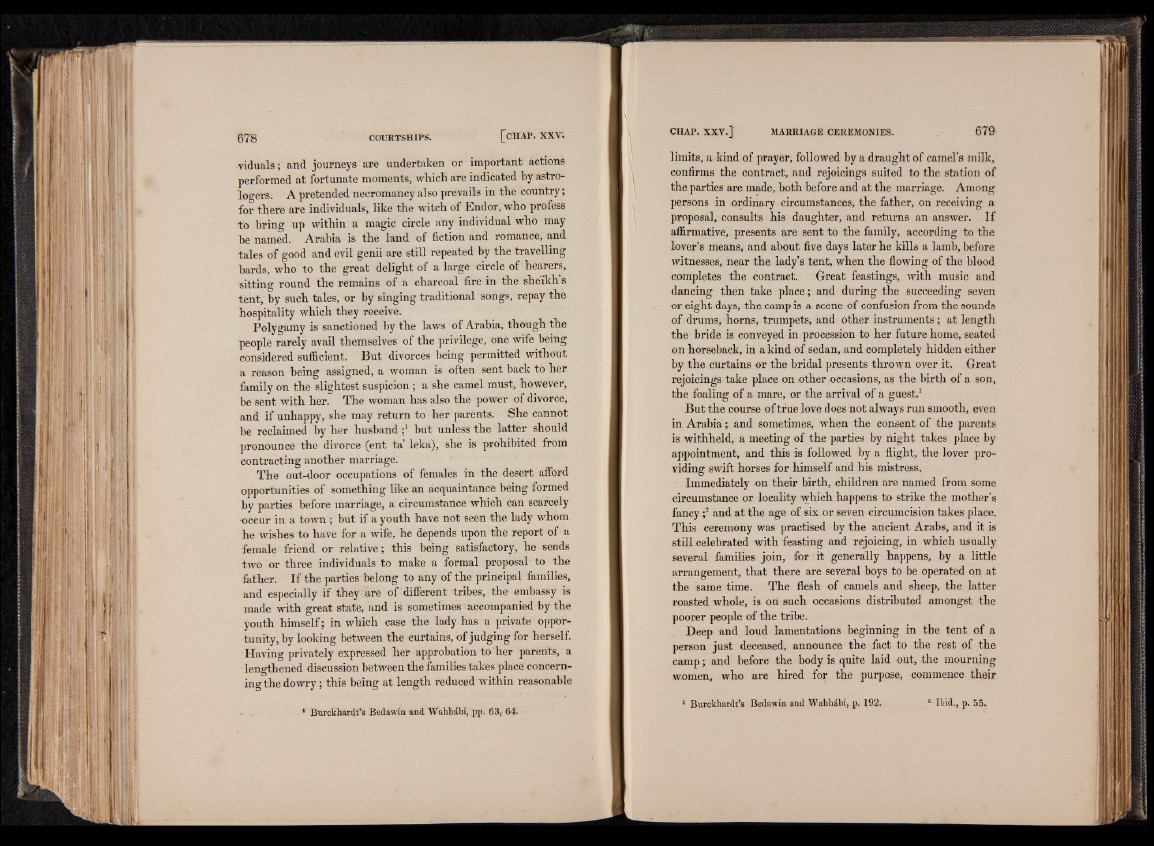
viduals; and journeys are undertaken or important actions
performed at fortunate moments, which are indicated by astrologers.
A pretended necromancy also prevails in the country;
for there are individuals, like the witch of Endor, who profess
to bring up within a magic circle any individual who may
be named. Arabia is the land of fiction and romance, and
tales of good and evil genii are still repeated by the travelling
bards, who to the great delight of a large circle of hearers,
sitting round the remains of a charcoal fire in the sheikh s
tent, by such tales, or by singing traditional songs, repay the
hospitality which they receive.
Polygamy is sanctioned by the laws of Arabia, though the
people rarely avail themselves of the privilege, one wife being
considered sufficient. But divorces being permitted without
a reason being assigned, a woman is often sent back to her
family on the- slightest suspicion; a she camel must, however,
be sent with her. The woman has also the power of divorce,
and if unhappy, she may return to her parents. She cannot
be reclaimed by her husbandbut unless the latter should
pronounce the divorce (ent ta’ leka), she is prohibited from
contracting another marriage.
The out-door occupations of females in the desert afford
opportunities of something like an acquaintance being formed
by parties before marriage, a circumstance which can scarcely
-occur in a town; but if a youth have not seen the lady whom
he wishes to have for a wife, he depends upon the report of a
female friend or relative; this being satisfactory, he sends
two or three individuals to make a formal proposal to the
father. If the parties belong to any of the principal families,
and especially if they are of different tribes, the embassy is
made with great state, and is sometimes accompanied by the
youth himself; in which case the lady has a private opportunity,
by looking between the curtains, of judging for herself.
Having privately expressed her approbation to her parents, a
lengthened discussion between the families takes place concerning
the dowry; this being at length reduced within reasonable
limits, a kind of prayer, followed by a draught of camel’s milk,
confirms the contract, and rejoicings suited to the station of
the parties are made, both before and at the marriage. Among
persons in ordinary circumstances, the father, on receiving a
proposal, consults his daughter, and returns an answer. If
affirmative, presents are sent to the family, according to the
lover’s means, and about five days later he kills a lamb, before
witnesses, near the lady’s tent, when the flowing of the blood
completes the contract. Great feastings, with music and
dancing then take place; and during the succeeding seven
or eight days, the camp is a scene of confusion from the sounds
of drums, horns, trumpets, and other instruments; at length
the bride is conveyed in procession to her future home, seated
on horseback, in a kind of sedan, and completely hidden either
by the curtains or the bridal presents thrown over it. Great
rejoicings take place on other occasions, as the birth of a son,
the foaling of a mare, or the arrival of a guest.1
But the course of true love does not always run smooth, even
in Arabia; and sometimes, when the consent of the parents
is withheld, a meeting of the parties by riight takes place by
appointment, and this is followed by a flight, the lover providing
swift horses for himself and his mistress.
Immediately on their birth, children are named from some
circumstance or locality vvhieh happens to strike the mother’s
fancy ;3 and at the age of six or seven circumcision takes place.
This ceremony was practised by the ancient Arabs, and it is
still celebrated with feasting and rejoicing, in which usually
several families join, for it generally happens, by a little
arrangement, that there are several boys to be operated on at
the same time. The flesh of camels and sheep, the latter
roasted whole, is on such occasions distributed amongst the
poorer people of the tribe.
Deep and loud lamentations beginning in the tent of a
person just deceased, announce the fact to the rest of the
camp; and before the body is quite laid out, the mourning
women, who are hired for the purpose, commence their